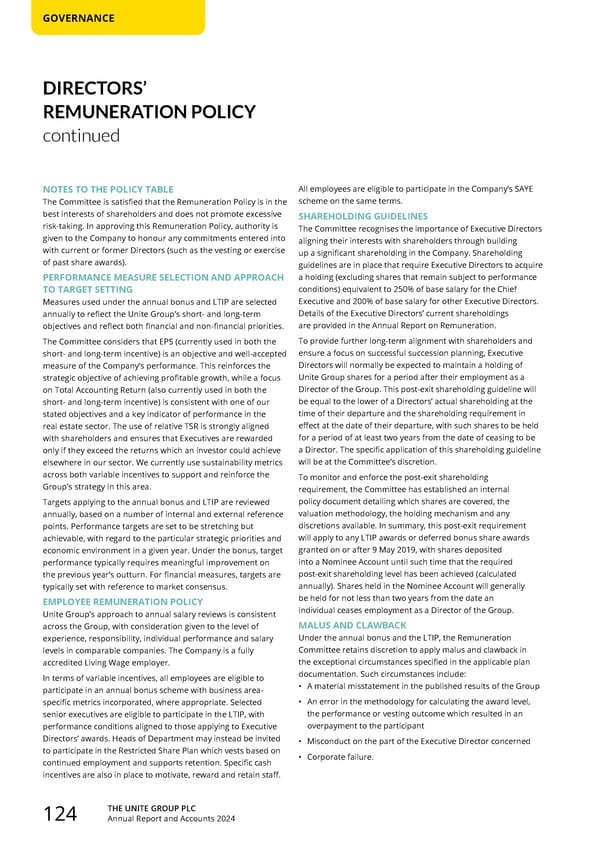THE UNITE GROUP PLC Annual Report and Accounts 2024 124 NOTES TO THE POLICY TABLE The Committee is satisfied that the Remuneration Policy is in the best interests of shareholders and does not promote excessive risk-taking. In approving this Remuneration Policy, authority is given to the Company to honour any commitments entered into with current or former Directors (such as the vesting or exercise of past share awards). PERFORMANCE MEASURE SELECTION AND APPROACH TO TARGET SETTING Measures used under the annual bonus and LTIP are selected annually to reflect the Unite Group’s short- and long-term objectives and reflect both financial and non-financial priorities. The Committee considers that EPS (currently used in both the short- and long-term incentive) is an objective and well-accepted measure of the Company’s performance. This reinforces the strategic objective of achieving profitable growth, while a focus on Total Accounting Return (also currently used in both the short- and long-term incentive) is consistent with one of our stated objectives and a key indicator of performance in the real estate sector. The use of relative TSR is strongly aligned with shareholders and ensures that Executives are rewarded only if they exceed the returns which an investor could achieve elsewhere in our sector. We currently use sustainability metrics across both variable incentives to support and reinforce the Group’s strategy in this area. Targets applying to the annual bonus and LTIP are reviewed annually, based on a number of internal and external reference points. Performance targets are set to be stretching but achievable, with regard to the particular strategic priorities and economic environment in a given year. Under the bonus, target performance typically requires meaningful improvement on the previous year’s outturn. For financial measures, targets are typically set with reference to market consensus. EMPLOYEE REMUNERATION POLICY Unite Group’s approach to annual salary reviews is consistent across the Group, with consideration given to the level of experience, responsibility, individual performance and salary levels in comparable companies. The Company is a fully accredited Living Wage employer. In terms of variable incentives, all employees are eligible to participate in an annual bonus scheme with business area- specific metrics incorporated, where appropriate. Selected senior executives are eligible to participate in the LTIP, with performance conditions aligned to those applying to Executive Directors’ awards. Heads of Department may instead be invited to participate in the Restricted Share Plan which vests based on continued employment and supports retention. Specific cash incentives are also in place to motivate, reward and retain staff. All employees are eligible to participate in the Company’s SAYE scheme on the same terms. SHAREHOLDING GUIDELINES The Committee recognises the importance of Executive Directors aligning their interests with shareholders through building up a significant shareholding in the Company. Shareholding guidelines are in place that require Executive Directors to acquire a holding (excluding shares that remain subject to performance conditions) equivalent to 250% of base salary for the Chief Executive and 200% of base salary for other Executive Directors. Details of the Executive Directors’ current shareholdings are provided in the Annual Report on Remuneration. To provide further long-term alignment with shareholders and ensure a focus on successful succession planning, Executive Directors will normally be expected to maintain a holding of Unite Group shares for a period after their employment as a Director of the Group. This post-exit shareholding guideline will be equal to the lower of a Directors’ actual shareholding at the time of their departure and the shareholding requirement in effect at the date of their departure, with such shares to be held for a period of at least two years from the date of ceasing to be a Director. The specific application of this shareholding guideline will be at the Committee’s discretion. To monitor and enforce the post-exit shareholding requirement, the Committee has established an internal policy document detailing which shares are covered, the valuation methodology, the holding mechanism and any discretions available. In summary, this post-exit requirement will apply to any LTIP awards or deferred bonus share awards granted on or after 9 May 2019, with shares deposited into a Nominee Account until such time that the required post-exit shareholding level has been achieved (calculated annually). Shares held in the Nominee Account will generally be held for not less than two years from the date an individual ceases employment as a Director of the Group. MALUS AND CLAWBACK Under the annual bonus and the LTIP, the Remuneration Committee retains discretion to apply malus and clawback in the exceptional circumstances specified in the applicable plan documentation. Such circumstances include: • A material misstatement in the published results of the Group • An error in the methodology for calculating the award level, the performance or vesting outcome which resulted in an overpayment to the participant • Misconduct on the part of the Executive Director concerned • Corporate failure. DIRECTORS’ REMUNERATION POLICY continued GOVERNANCE
 Home for Success: Unite Students Annual Report 2024 Page 125 Page 127
Home for Success: Unite Students Annual Report 2024 Page 125 Page 127